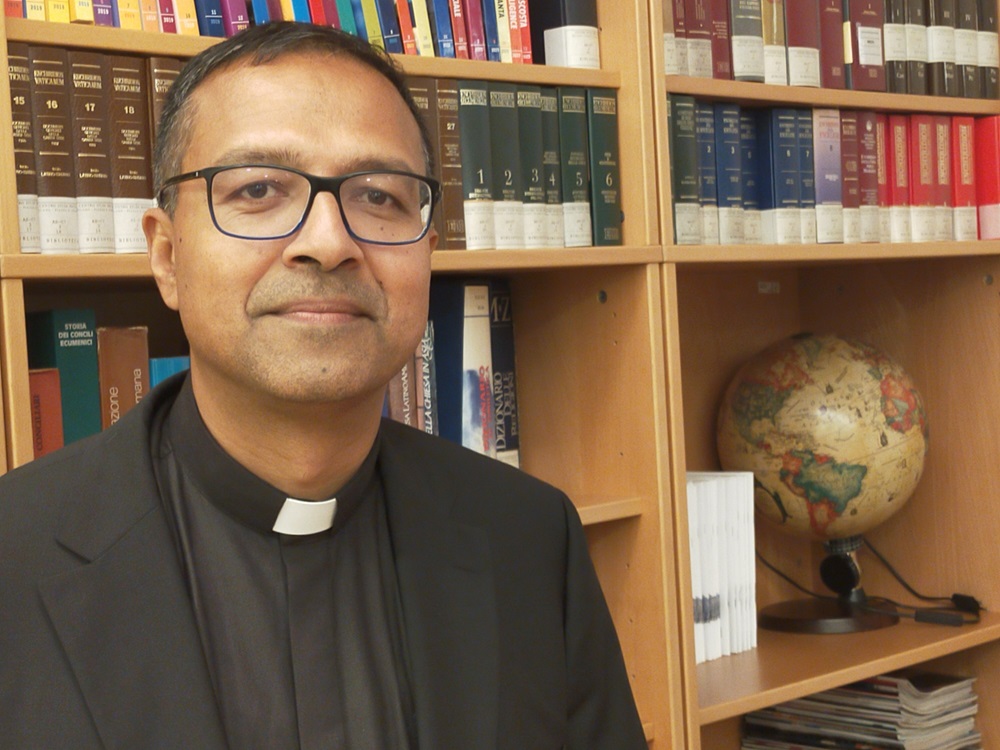Astronomer Father D'Souza seeks his periphery in the ‘most distant stars’
An Indian Jesuit from Goa, he is the superior of the community of the Vatican Observatory. He told AsiaNews that his “field of research is the origins of galaxies” billions of years ago, studying “the complexity and beauty of the universe”. Tools exist to find answers about “what exists outside the solar system”.
Milan (AsiaNews) – We live at a privileged time to scrutinise the history of the universe. Science today can take us even to peripheries billions of years away, this according to Father Richard D'Souza.
The 46-year-old’s mission is decidedly special. Born into a Christian family from Goa, India, he is in the privileged position of looking at the stars furthest from our solar system. Superior of the Jesuit community at the Vatican Observatory, he is an astrophysicist with a PhD from the Max Planck Institute in Munich with further studies at the University of Michigan.
"My field of research is the origins of galaxies. In practice, I am an archaeologist of the stars," he explained. “I study how they were born and how they change over time, through clues that reveal phenomena that happened billions of years ago. How stars form and how different galaxies attract each other until they merge with each other.
"We know, for example, that the Milky Way, within which we all live, is attracting two more galaxies. In two or three billion years, they will be a single reality. Through mathematical models we try to understand what this will entail.”
For Father D'Souza, it all began with a passion for science: an Indian boy who had many friends among the Jesuits. “I was fascinated by the stories about the studies of Matteo Ricci and other confreres," he noted. “So after finishing the novitiate, my province sent me to study physics in Mumbai."
Step by step, his journey brought him to the Vatican Observatory (Specola Vaticana), in Castel Gandolfo, which today can also count on a highly advanced telescope on Mount Graham in Arizona, United States. About 15 Jesuits of different nationalities work in the two offices, including a Congolese confrere.
“The Church's interest in the sky is something very ancient. Think of the importance the Vatican observatory has had for the elaboration of calendars and coming up with the date of Easter. When, with the loss of political control over Rome, the question arose of re-establishing the Specola, Leo XIII entrusted this institution with the specific task of making science and faith talk to each other. And that's what we are still doing today.”
“If I look at what we do every day, I would say that 70 per cent of our work is aimed at research,” the Indian Jesuit said. “We carry out our studies, we participate in congresses, we work with other observatories. We find great openness towards us everywhere. The most difficult part, perhaps, is the other 30 per cent, i.e. the time we devote to activities to remind the Church that science is not a hostile world. In this area, we still carry with us a lot of past suspicion and resistance.”
What does Observatory’s research on galaxies says to faith? “We do not look at the sky to investigate God, but at the reality of the universe,” Father Richard explained. “The more we think about the complexity of creation, the more we realise its beauty, even though, in a certain sense, we work to offer new reasons to praise God through a better understanding of his work.”
"We do not study scientific areas that have immediate effects, like ecology or climatology; instead, we try to answer the deepest questions humanity carries inside: Where do we come from? What is our place in the universe?
"We can also try to imagine the end of our sun, pushing ourselves fast forward in time. All this fascinates at every latitude. When I was in Kenya, I tried to make the kids in a shantytown look at the rings of Saturn; the amazement and the questions these observations generated are the same everywhere.”
For Father D'Souza, in a not too distant future, one of the great questions that always arises when scanning the sky will become central, namely, Are we alone in the universe?
“Today we have new tools to seek an answer, because we are making great progress in the investigation of what exists outside the solar system. We now study the atmosphere of those planets and I am convinced that within 20 years we will have evidence of the presence of life forms in some of the billions of stars we know exist.
“Today we cannot yet say for sure, but all the conditions are there for this to happen. We are obviously talking about elementary life forms, molecules; but if they exist, the possibility of development into intelligent life forms cannot be excluded.
“What would such a discovery mean? And how can it be placed in relation to Revelation? I have the impression that theology will soon find itself dealing with questions such as those raised by the discovery of ‘new worlds’ across the ocean . . .”.
In the meantime, astronomy must also deal with much more down-to-earth issues, like the exponential growth in resource exploitation, which risks creating problems for its own work.
“The proliferation of satellites used for Internet connections risks hiding the sky again; not only Elon Musk's,” Father D'Souza said. “Other competing companies are entering this market, each with hundreds of satellites that must rotate at a certain speed in the lower atmosphere,” to enable “telecommunications, leaving traces that heavily pollute the radio signals picked up by telescopes. It is a great threat to our work.”







.png)










